Sustainable Tourism: Impacts & Principles - Conference Report
VerifiedAdded on 2023/01/12
|15
|4156
|31
Report
AI Summary
This report provides an overview of sustainable tourism based on an international conference. It explores the history of sustainable tourism, the roles of global organizations in promoting responsible tourism, and the principles and processes of tourism development aimed at minimizing adverse effects. The report investigates the economic, social, cultural, and environmental impacts of tourism, highlighting the principles of sustainability implemented by specific tourism businesses. It also examines the development of sustainability in various tourist destinations worldwide, offering insights into how tourism can be managed to benefit both visitors and local communities while preserving cultural and environmental resources. This document contributed by a student is available on Desklib, a platform offering study tools and resources.
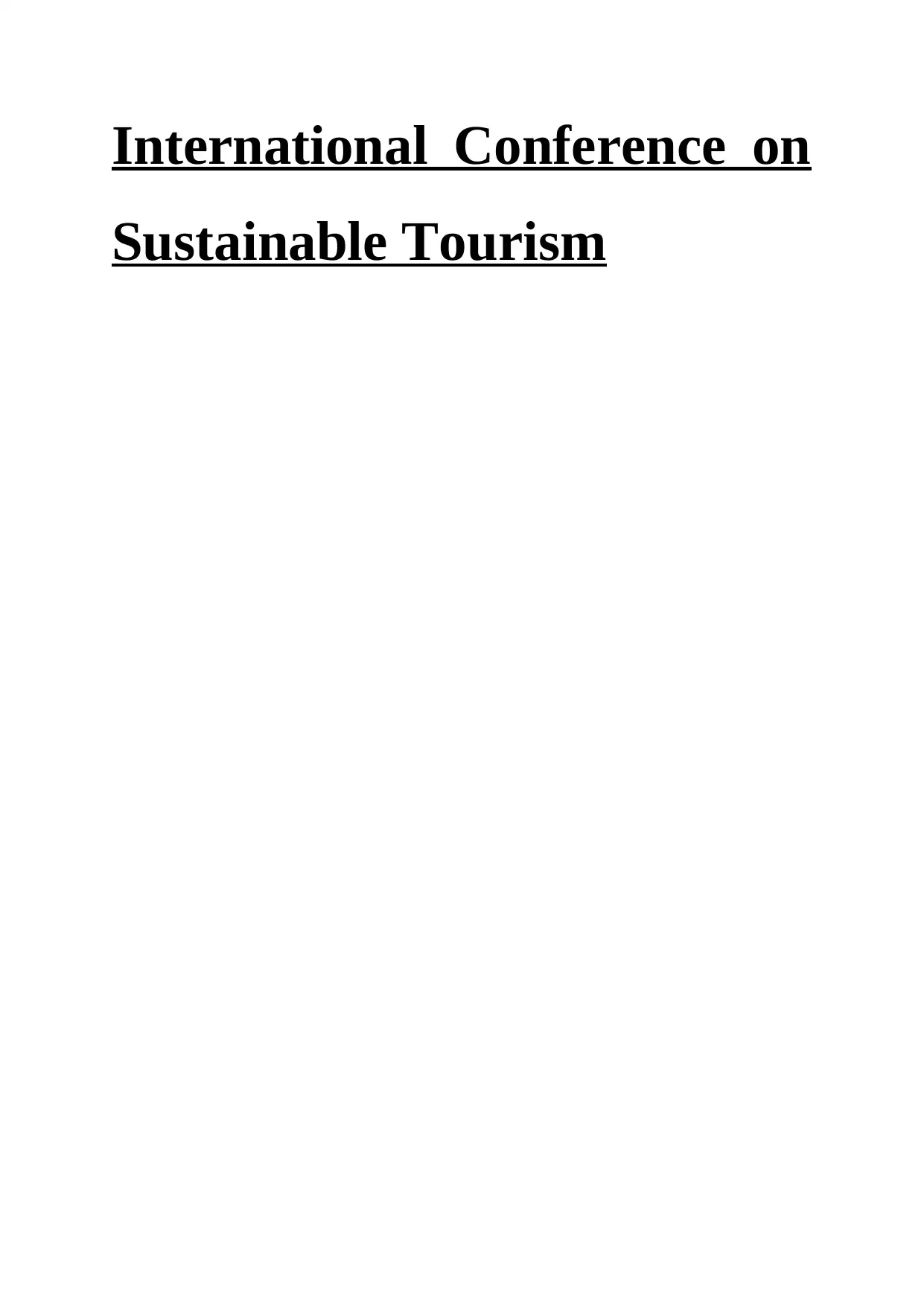
International Conference on
Sustainable Tourism
Sustainable Tourism
Paraphrase This Document
Need a fresh take? Get an instant paraphrase of this document with our AI Paraphraser
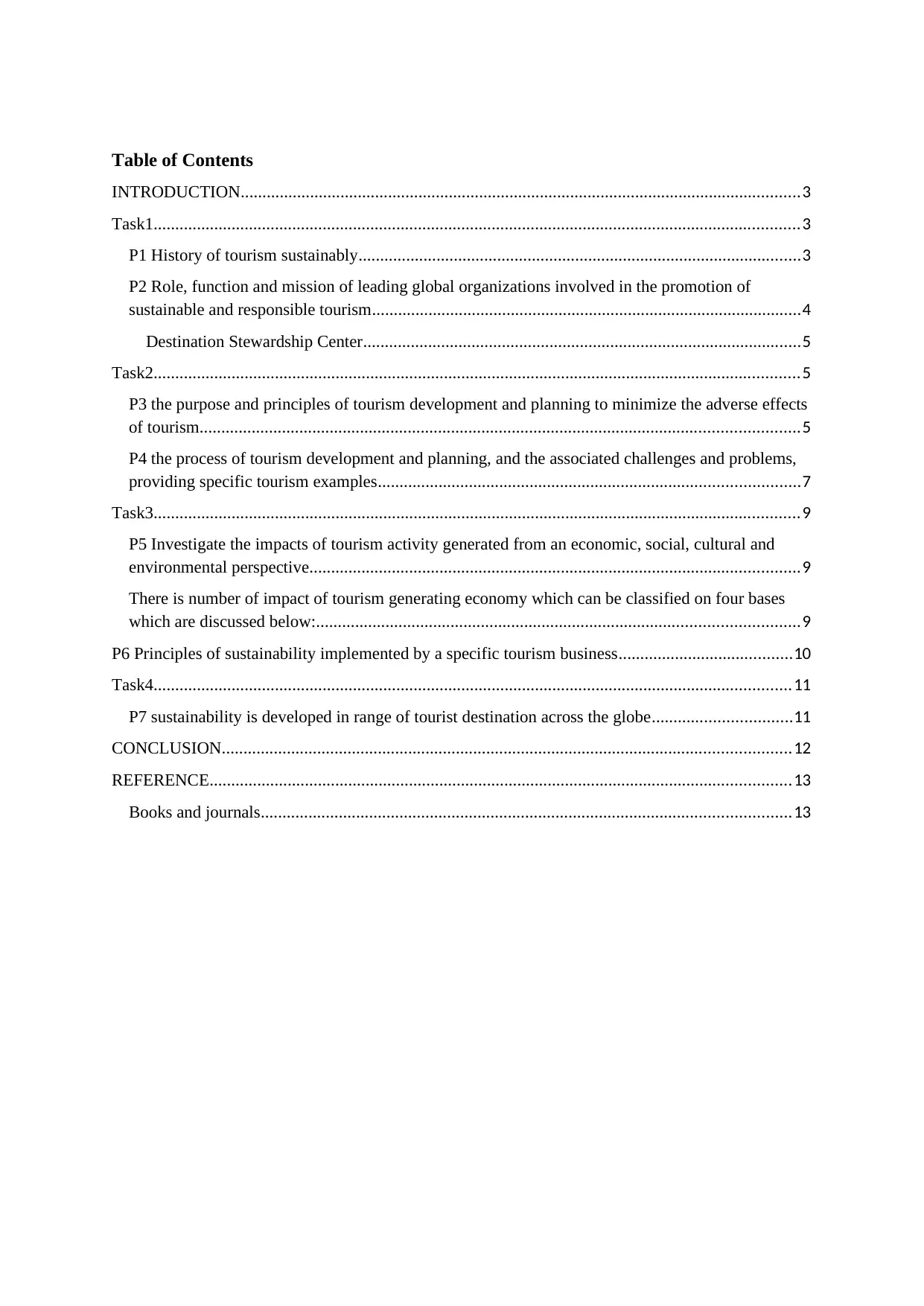
Table of Contents
INTRODUCTION.................................................................................................................................3
Task1.....................................................................................................................................................3
P1 History of tourism sustainably......................................................................................................3
P2 Role, function and mission of leading global organizations involved in the promotion of
sustainable and responsible tourism...................................................................................................4
Destination Stewardship Center.....................................................................................................5
Task2.....................................................................................................................................................5
P3 the purpose and principles of tourism development and planning to minimize the adverse effects
of tourism..........................................................................................................................................5
P4 the process of tourism development and planning, and the associated challenges and problems,
providing specific tourism examples.................................................................................................7
Task3.....................................................................................................................................................9
P5 Investigate the impacts of tourism activity generated from an economic, social, cultural and
environmental perspective.................................................................................................................9
There is number of impact of tourism generating economy which can be classified on four bases
which are discussed below:...............................................................................................................9
P6 Principles of sustainability implemented by a specific tourism business........................................10
Task4...................................................................................................................................................11
P7 sustainability is developed in range of tourist destination across the globe................................11
CONCLUSION...................................................................................................................................12
REFERENCE......................................................................................................................................13
Books and journals..........................................................................................................................13
INTRODUCTION.................................................................................................................................3
Task1.....................................................................................................................................................3
P1 History of tourism sustainably......................................................................................................3
P2 Role, function and mission of leading global organizations involved in the promotion of
sustainable and responsible tourism...................................................................................................4
Destination Stewardship Center.....................................................................................................5
Task2.....................................................................................................................................................5
P3 the purpose and principles of tourism development and planning to minimize the adverse effects
of tourism..........................................................................................................................................5
P4 the process of tourism development and planning, and the associated challenges and problems,
providing specific tourism examples.................................................................................................7
Task3.....................................................................................................................................................9
P5 Investigate the impacts of tourism activity generated from an economic, social, cultural and
environmental perspective.................................................................................................................9
There is number of impact of tourism generating economy which can be classified on four bases
which are discussed below:...............................................................................................................9
P6 Principles of sustainability implemented by a specific tourism business........................................10
Task4...................................................................................................................................................11
P7 sustainability is developed in range of tourist destination across the globe................................11
CONCLUSION...................................................................................................................................12
REFERENCE......................................................................................................................................13
Books and journals..........................................................................................................................13
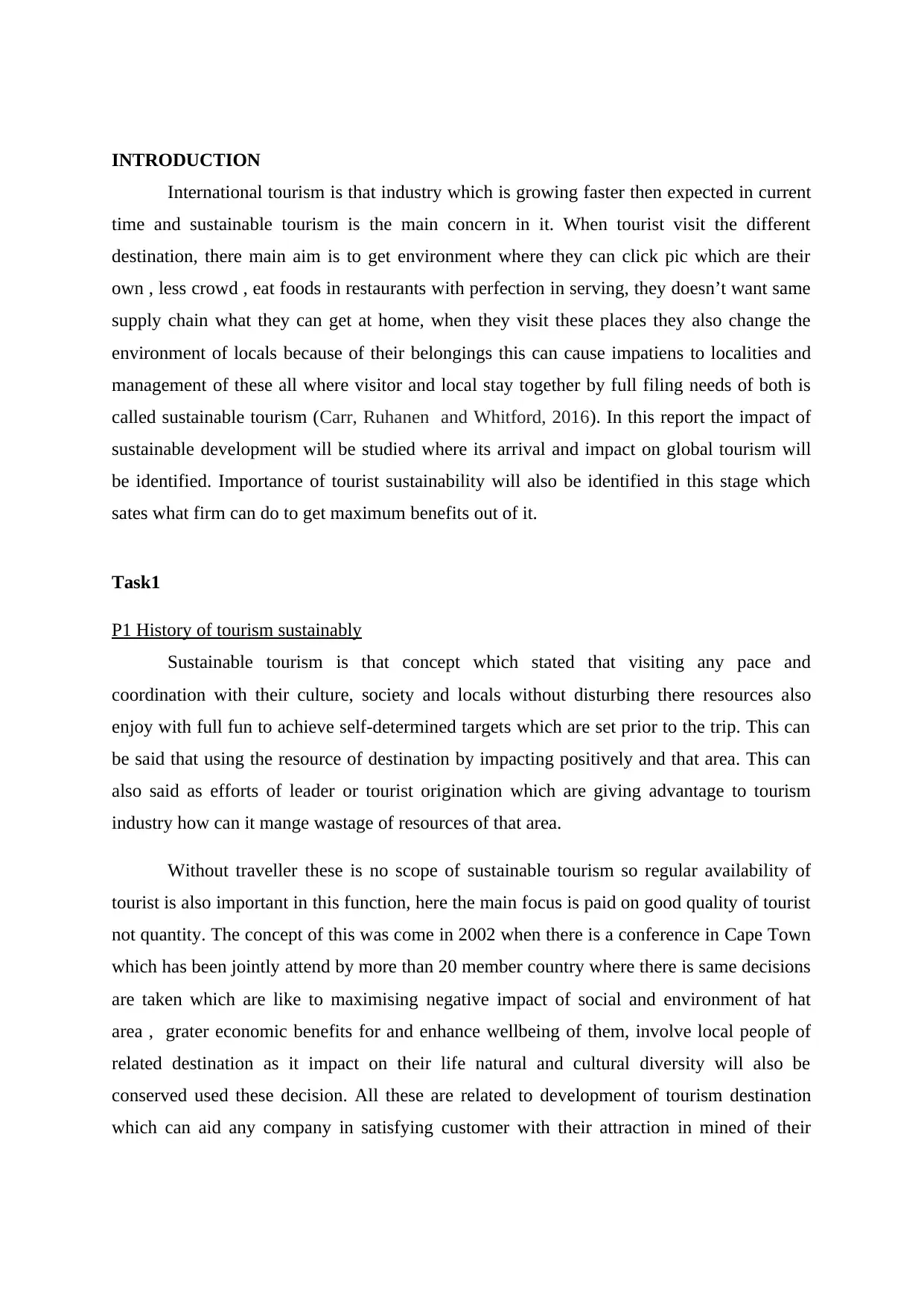
INTRODUCTION
International tourism is that industry which is growing faster then expected in current
time and sustainable tourism is the main concern in it. When tourist visit the different
destination, there main aim is to get environment where they can click pic which are their
own , less crowd , eat foods in restaurants with perfection in serving, they doesn’t want same
supply chain what they can get at home, when they visit these places they also change the
environment of locals because of their belongings this can cause impatiens to localities and
management of these all where visitor and local stay together by full filing needs of both is
called sustainable tourism (Carr, Ruhanen and Whitford, 2016). In this report the impact of
sustainable development will be studied where its arrival and impact on global tourism will
be identified. Importance of tourist sustainability will also be identified in this stage which
sates what firm can do to get maximum benefits out of it.
Task1
P1 History of tourism sustainably
Sustainable tourism is that concept which stated that visiting any pace and
coordination with their culture, society and locals without disturbing there resources also
enjoy with full fun to achieve self-determined targets which are set prior to the trip. This can
be said that using the resource of destination by impacting positively and that area. This can
also said as efforts of leader or tourist origination which are giving advantage to tourism
industry how can it mange wastage of resources of that area.
Without traveller these is no scope of sustainable tourism so regular availability of
tourist is also important in this function, here the main focus is paid on good quality of tourist
not quantity. The concept of this was come in 2002 when there is a conference in Cape Town
which has been jointly attend by more than 20 member country where there is same decisions
are taken which are like to maximising negative impact of social and environment of hat
area , grater economic benefits for and enhance wellbeing of them, involve local people of
related destination as it impact on their life natural and cultural diversity will also be
conserved used these decision. All these are related to development of tourism destination
which can aid any company in satisfying customer with their attraction in mined of their
International tourism is that industry which is growing faster then expected in current
time and sustainable tourism is the main concern in it. When tourist visit the different
destination, there main aim is to get environment where they can click pic which are their
own , less crowd , eat foods in restaurants with perfection in serving, they doesn’t want same
supply chain what they can get at home, when they visit these places they also change the
environment of locals because of their belongings this can cause impatiens to localities and
management of these all where visitor and local stay together by full filing needs of both is
called sustainable tourism (Carr, Ruhanen and Whitford, 2016). In this report the impact of
sustainable development will be studied where its arrival and impact on global tourism will
be identified. Importance of tourist sustainability will also be identified in this stage which
sates what firm can do to get maximum benefits out of it.
Task1
P1 History of tourism sustainably
Sustainable tourism is that concept which stated that visiting any pace and
coordination with their culture, society and locals without disturbing there resources also
enjoy with full fun to achieve self-determined targets which are set prior to the trip. This can
be said that using the resource of destination by impacting positively and that area. This can
also said as efforts of leader or tourist origination which are giving advantage to tourism
industry how can it mange wastage of resources of that area.
Without traveller these is no scope of sustainable tourism so regular availability of
tourist is also important in this function, here the main focus is paid on good quality of tourist
not quantity. The concept of this was come in 2002 when there is a conference in Cape Town
which has been jointly attend by more than 20 member country where there is same decisions
are taken which are like to maximising negative impact of social and environment of hat
area , grater economic benefits for and enhance wellbeing of them, involve local people of
related destination as it impact on their life natural and cultural diversity will also be
conserved used these decision. All these are related to development of tourism destination
which can aid any company in satisfying customer with their attraction in mined of their
⊘ This is a preview!⊘
Do you want full access?
Subscribe today to unlock all pages.

Trusted by 1+ million students worldwide
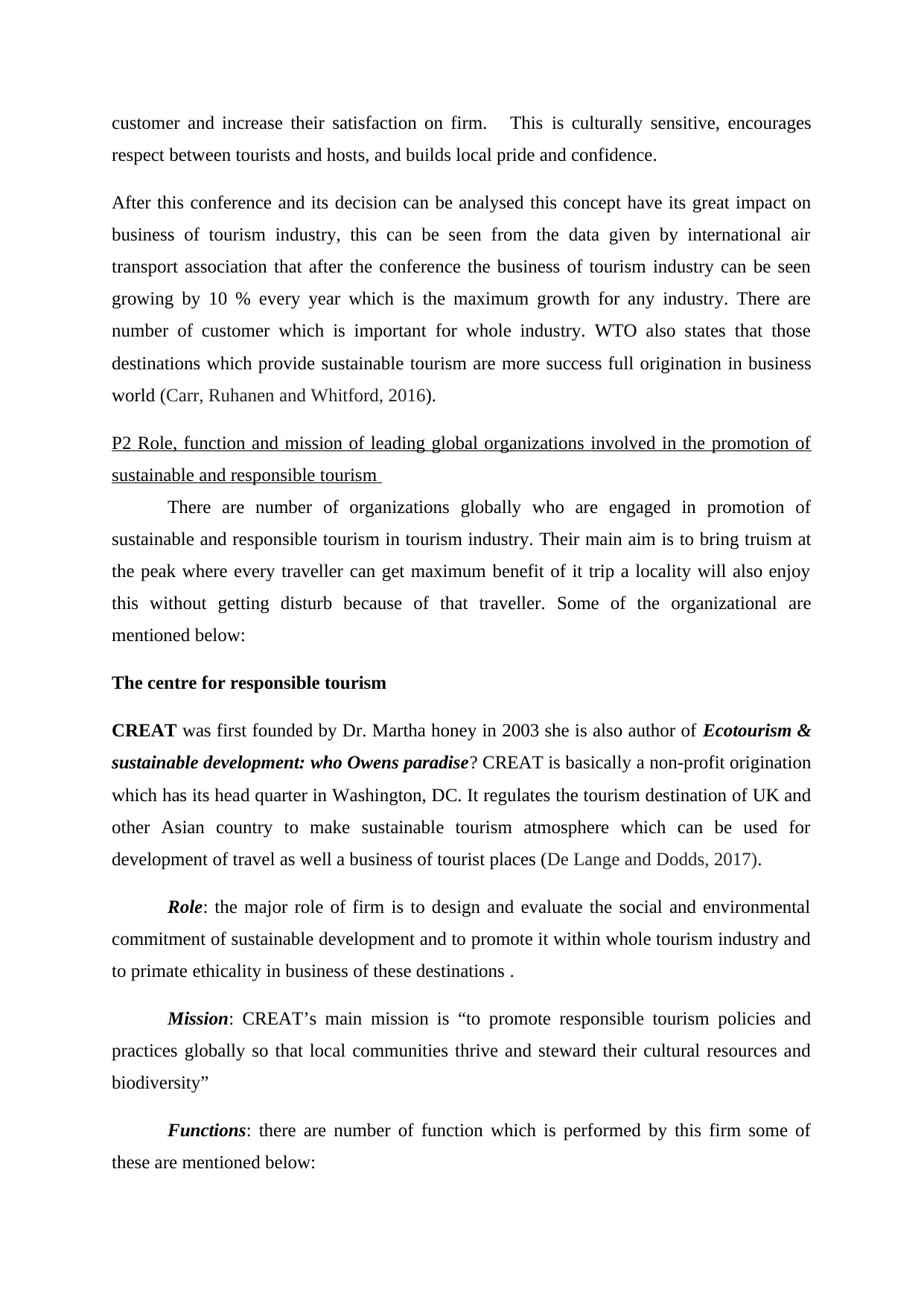
customer and increase their satisfaction on firm. This is culturally sensitive, encourages
respect between tourists and hosts, and builds local pride and confidence.
After this conference and its decision can be analysed this concept have its great impact on
business of tourism industry, this can be seen from the data given by international air
transport association that after the conference the business of tourism industry can be seen
growing by 10 % every year which is the maximum growth for any industry. There are
number of customer which is important for whole industry. WTO also states that those
destinations which provide sustainable tourism are more success full origination in business
world (Carr, Ruhanen and Whitford, 2016).
P2 Role, function and mission of leading global organizations involved in the promotion of
sustainable and responsible tourism
There are number of organizations globally who are engaged in promotion of
sustainable and responsible tourism in tourism industry. Their main aim is to bring truism at
the peak where every traveller can get maximum benefit of it trip a locality will also enjoy
this without getting disturb because of that traveller. Some of the organizational are
mentioned below:
The centre for responsible tourism
CREAT was first founded by Dr. Martha honey in 2003 she is also author of Ecotourism &
sustainable development: who Owens paradise? CREAT is basically a non-profit origination
which has its head quarter in Washington, DC. It regulates the tourism destination of UK and
other Asian country to make sustainable tourism atmosphere which can be used for
development of travel as well a business of tourist places (De Lange and Dodds, 2017).
Role: the major role of firm is to design and evaluate the social and environmental
commitment of sustainable development and to promote it within whole tourism industry and
to primate ethicality in business of these destinations .
Mission: CREAT’s main mission is “to promote responsible tourism policies and
practices globally so that local communities thrive and steward their cultural resources and
biodiversity”
Functions: there are number of function which is performed by this firm some of
these are mentioned below:
respect between tourists and hosts, and builds local pride and confidence.
After this conference and its decision can be analysed this concept have its great impact on
business of tourism industry, this can be seen from the data given by international air
transport association that after the conference the business of tourism industry can be seen
growing by 10 % every year which is the maximum growth for any industry. There are
number of customer which is important for whole industry. WTO also states that those
destinations which provide sustainable tourism are more success full origination in business
world (Carr, Ruhanen and Whitford, 2016).
P2 Role, function and mission of leading global organizations involved in the promotion of
sustainable and responsible tourism
There are number of organizations globally who are engaged in promotion of
sustainable and responsible tourism in tourism industry. Their main aim is to bring truism at
the peak where every traveller can get maximum benefit of it trip a locality will also enjoy
this without getting disturb because of that traveller. Some of the organizational are
mentioned below:
The centre for responsible tourism
CREAT was first founded by Dr. Martha honey in 2003 she is also author of Ecotourism &
sustainable development: who Owens paradise? CREAT is basically a non-profit origination
which has its head quarter in Washington, DC. It regulates the tourism destination of UK and
other Asian country to make sustainable tourism atmosphere which can be used for
development of travel as well a business of tourist places (De Lange and Dodds, 2017).
Role: the major role of firm is to design and evaluate the social and environmental
commitment of sustainable development and to promote it within whole tourism industry and
to primate ethicality in business of these destinations .
Mission: CREAT’s main mission is “to promote responsible tourism policies and
practices globally so that local communities thrive and steward their cultural resources and
biodiversity”
Functions: there are number of function which is performed by this firm some of
these are mentioned below:
Paraphrase This Document
Need a fresh take? Get an instant paraphrase of this document with our AI Paraphraser
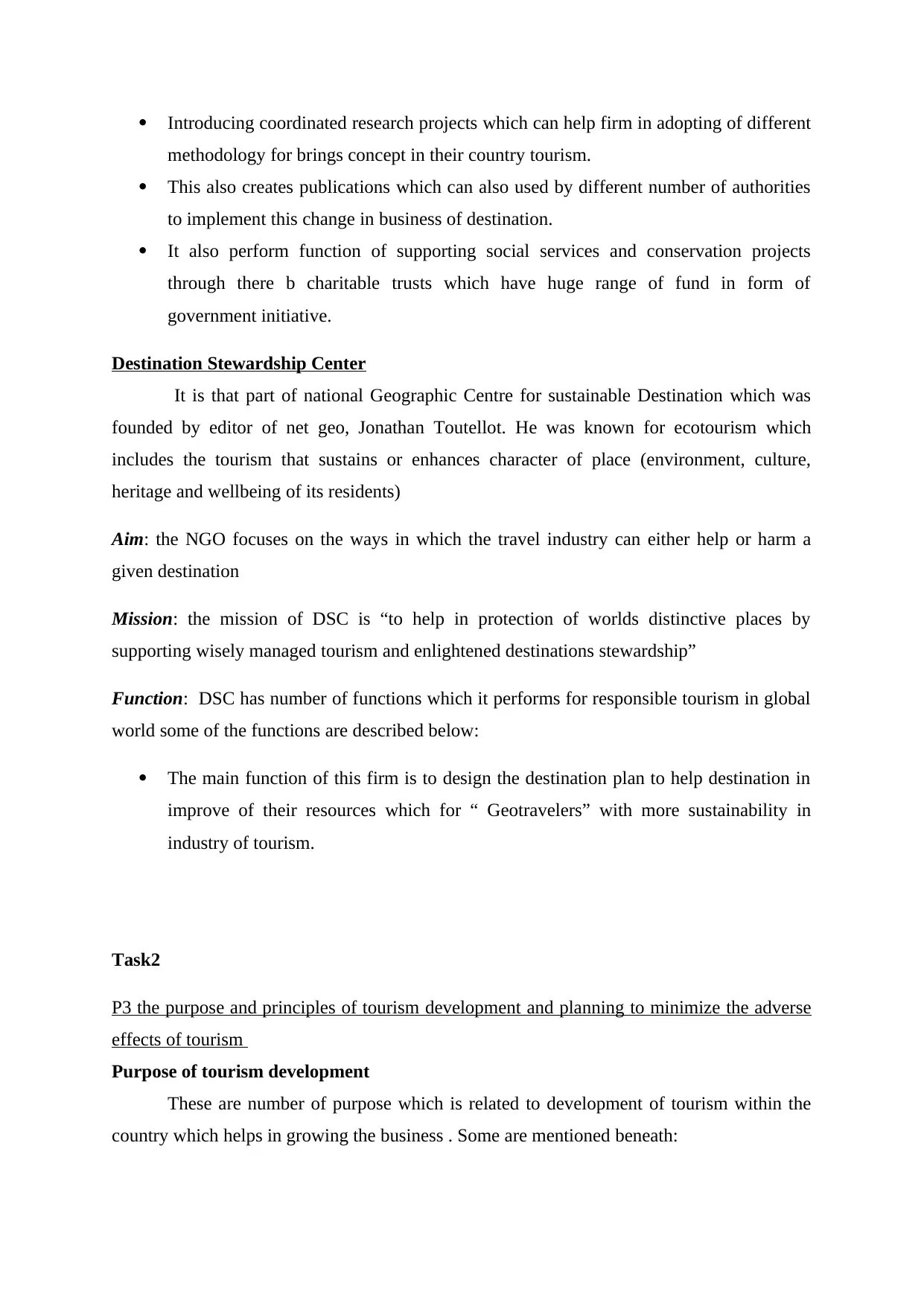
Introducing coordinated research projects which can help firm in adopting of different
methodology for brings concept in their country tourism.
This also creates publications which can also used by different number of authorities
to implement this change in business of destination.
It also perform function of supporting social services and conservation projects
through there b charitable trusts which have huge range of fund in form of
government initiative.
Destination Stewardship Center
It is that part of national Geographic Centre for sustainable Destination which was
founded by editor of net geo, Jonathan Toutellot. He was known for ecotourism which
includes the tourism that sustains or enhances character of place (environment, culture,
heritage and wellbeing of its residents)
Aim: the NGO focuses on the ways in which the travel industry can either help or harm a
given destination
Mission: the mission of DSC is “to help in protection of worlds distinctive places by
supporting wisely managed tourism and enlightened destinations stewardship”
Function: DSC has number of functions which it performs for responsible tourism in global
world some of the functions are described below:
The main function of this firm is to design the destination plan to help destination in
improve of their resources which for “ Geotravelers” with more sustainability in
industry of tourism.
Task2
P3 the purpose and principles of tourism development and planning to minimize the adverse
effects of tourism
Purpose of tourism development
These are number of purpose which is related to development of tourism within the
country which helps in growing the business . Some are mentioned beneath:
methodology for brings concept in their country tourism.
This also creates publications which can also used by different number of authorities
to implement this change in business of destination.
It also perform function of supporting social services and conservation projects
through there b charitable trusts which have huge range of fund in form of
government initiative.
Destination Stewardship Center
It is that part of national Geographic Centre for sustainable Destination which was
founded by editor of net geo, Jonathan Toutellot. He was known for ecotourism which
includes the tourism that sustains or enhances character of place (environment, culture,
heritage and wellbeing of its residents)
Aim: the NGO focuses on the ways in which the travel industry can either help or harm a
given destination
Mission: the mission of DSC is “to help in protection of worlds distinctive places by
supporting wisely managed tourism and enlightened destinations stewardship”
Function: DSC has number of functions which it performs for responsible tourism in global
world some of the functions are described below:
The main function of this firm is to design the destination plan to help destination in
improve of their resources which for “ Geotravelers” with more sustainability in
industry of tourism.
Task2
P3 the purpose and principles of tourism development and planning to minimize the adverse
effects of tourism
Purpose of tourism development
These are number of purpose which is related to development of tourism within the
country which helps in growing the business . Some are mentioned beneath:
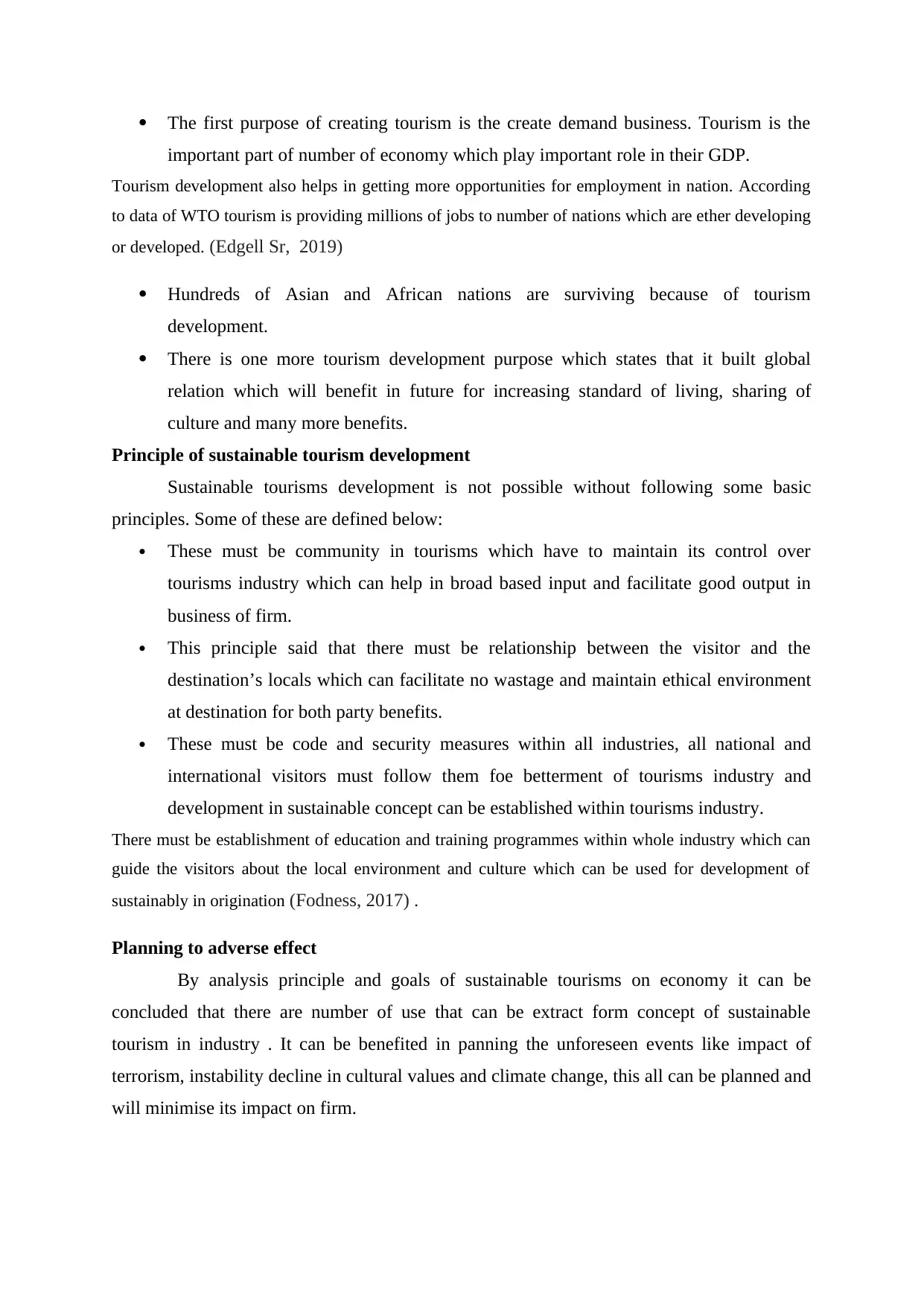
The first purpose of creating tourism is the create demand business. Tourism is the
important part of number of economy which play important role in their GDP.
Tourism development also helps in getting more opportunities for employment in nation. According
to data of WTO tourism is providing millions of jobs to number of nations which are ether developing
or developed. (Edgell Sr, 2019)
Hundreds of Asian and African nations are surviving because of tourism
development.
There is one more tourism development purpose which states that it built global
relation which will benefit in future for increasing standard of living, sharing of
culture and many more benefits.
Principle of sustainable tourism development
Sustainable tourisms development is not possible without following some basic
principles. Some of these are defined below:
These must be community in tourisms which have to maintain its control over
tourisms industry which can help in broad based input and facilitate good output in
business of firm.
This principle said that there must be relationship between the visitor and the
destination’s locals which can facilitate no wastage and maintain ethical environment
at destination for both party benefits.
These must be code and security measures within all industries, all national and
international visitors must follow them foe betterment of tourisms industry and
development in sustainable concept can be established within tourisms industry.
There must be establishment of education and training programmes within whole industry which can
guide the visitors about the local environment and culture which can be used for development of
sustainably in origination (Fodness, 2017) .
Planning to adverse effect
By analysis principle and goals of sustainable tourisms on economy it can be
concluded that there are number of use that can be extract form concept of sustainable
tourism in industry . It can be benefited in panning the unforeseen events like impact of
terrorism, instability decline in cultural values and climate change, this all can be planned and
will minimise its impact on firm.
important part of number of economy which play important role in their GDP.
Tourism development also helps in getting more opportunities for employment in nation. According
to data of WTO tourism is providing millions of jobs to number of nations which are ether developing
or developed. (Edgell Sr, 2019)
Hundreds of Asian and African nations are surviving because of tourism
development.
There is one more tourism development purpose which states that it built global
relation which will benefit in future for increasing standard of living, sharing of
culture and many more benefits.
Principle of sustainable tourism development
Sustainable tourisms development is not possible without following some basic
principles. Some of these are defined below:
These must be community in tourisms which have to maintain its control over
tourisms industry which can help in broad based input and facilitate good output in
business of firm.
This principle said that there must be relationship between the visitor and the
destination’s locals which can facilitate no wastage and maintain ethical environment
at destination for both party benefits.
These must be code and security measures within all industries, all national and
international visitors must follow them foe betterment of tourisms industry and
development in sustainable concept can be established within tourisms industry.
There must be establishment of education and training programmes within whole industry which can
guide the visitors about the local environment and culture which can be used for development of
sustainably in origination (Fodness, 2017) .
Planning to adverse effect
By analysis principle and goals of sustainable tourisms on economy it can be
concluded that there are number of use that can be extract form concept of sustainable
tourism in industry . It can be benefited in panning the unforeseen events like impact of
terrorism, instability decline in cultural values and climate change, this all can be planned and
will minimise its impact on firm.
⊘ This is a preview!⊘
Do you want full access?
Subscribe today to unlock all pages.

Trusted by 1+ million students worldwide
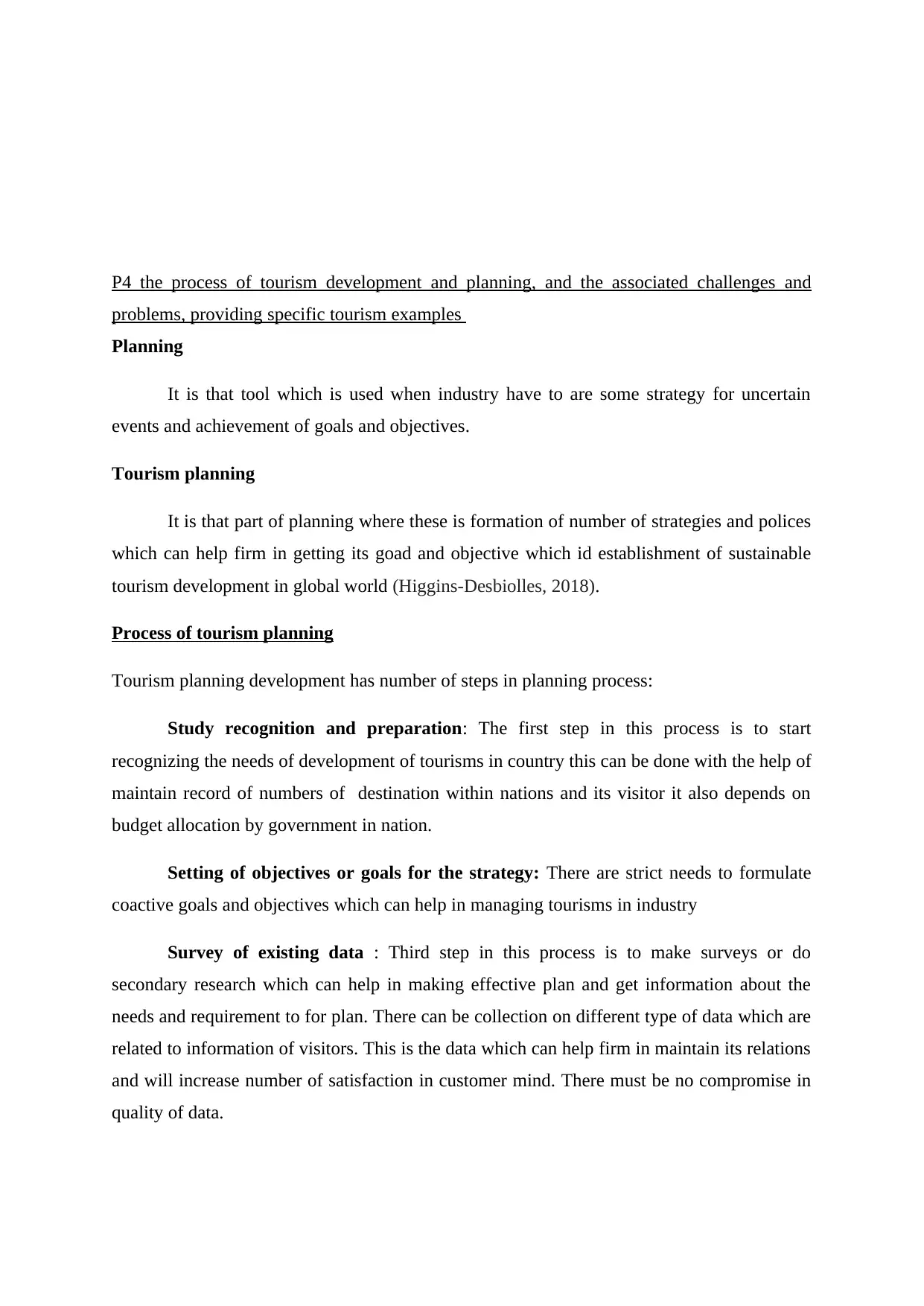
P4 the process of tourism development and planning, and the associated challenges and
problems, providing specific tourism examples
Planning
It is that tool which is used when industry have to are some strategy for uncertain
events and achievement of goals and objectives.
Tourism planning
It is that part of planning where these is formation of number of strategies and polices
which can help firm in getting its goad and objective which id establishment of sustainable
tourism development in global world (Higgins-Desbiolles, 2018).
Process of tourism planning
Tourism planning development has number of steps in planning process:
Study recognition and preparation: The first step in this process is to start
recognizing the needs of development of tourisms in country this can be done with the help of
maintain record of numbers of destination within nations and its visitor it also depends on
budget allocation by government in nation.
Setting of objectives or goals for the strategy: There are strict needs to formulate
coactive goals and objectives which can help in managing tourisms in industry
Survey of existing data : Third step in this process is to make surveys or do
secondary research which can help in making effective plan and get information about the
needs and requirement to for plan. There can be collection on different type of data which are
related to information of visitors. This is the data which can help firm in maintain its relations
and will increase number of satisfaction in customer mind. There must be no compromise in
quality of data.
problems, providing specific tourism examples
Planning
It is that tool which is used when industry have to are some strategy for uncertain
events and achievement of goals and objectives.
Tourism planning
It is that part of planning where these is formation of number of strategies and polices
which can help firm in getting its goad and objective which id establishment of sustainable
tourism development in global world (Higgins-Desbiolles, 2018).
Process of tourism planning
Tourism planning development has number of steps in planning process:
Study recognition and preparation: The first step in this process is to start
recognizing the needs of development of tourisms in country this can be done with the help of
maintain record of numbers of destination within nations and its visitor it also depends on
budget allocation by government in nation.
Setting of objectives or goals for the strategy: There are strict needs to formulate
coactive goals and objectives which can help in managing tourisms in industry
Survey of existing data : Third step in this process is to make surveys or do
secondary research which can help in making effective plan and get information about the
needs and requirement to for plan. There can be collection on different type of data which are
related to information of visitors. This is the data which can help firm in maintain its relations
and will increase number of satisfaction in customer mind. There must be no compromise in
quality of data.
Paraphrase This Document
Need a fresh take? Get an instant paraphrase of this document with our AI Paraphraser
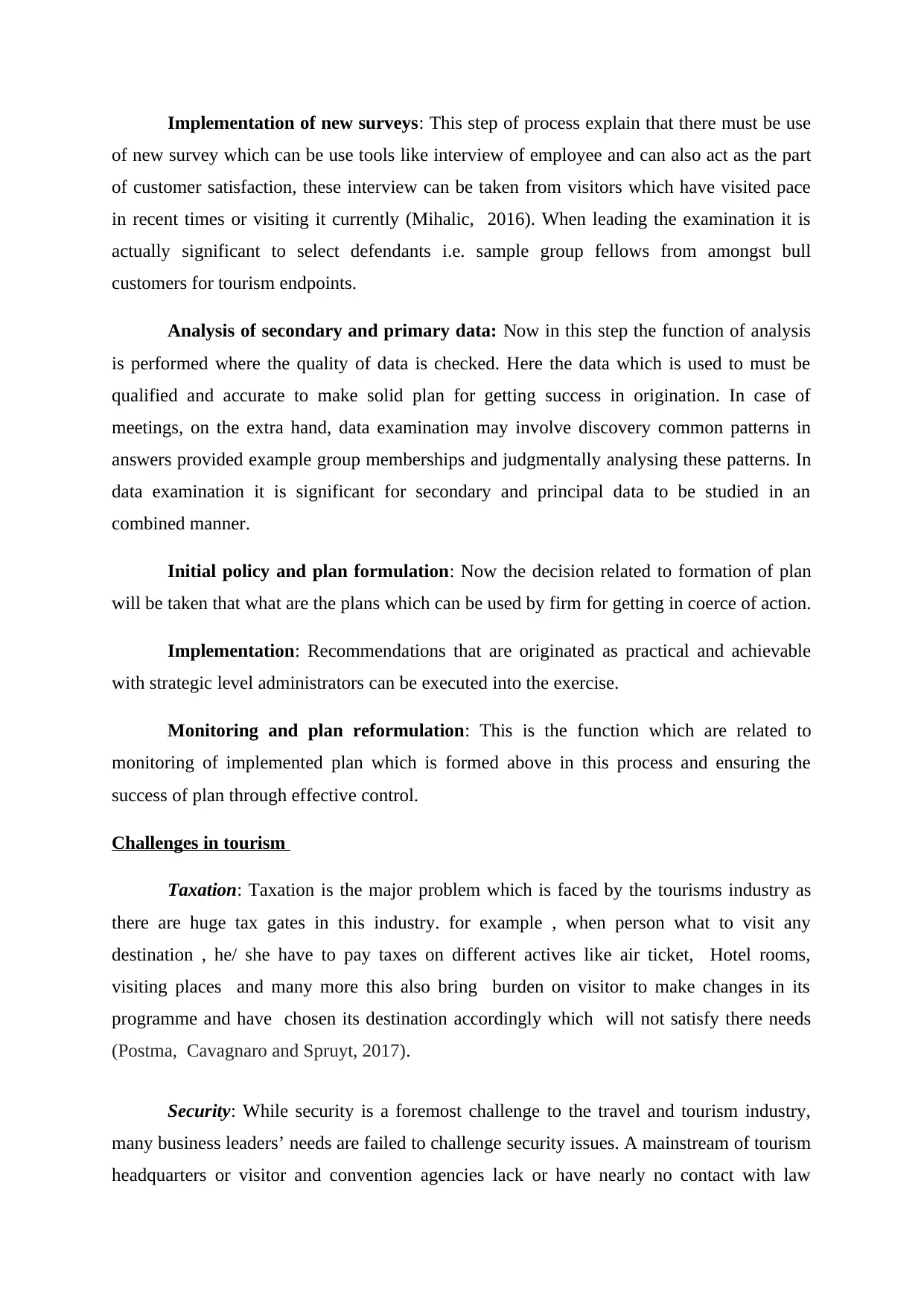
Implementation of new surveys: This step of process explain that there must be use
of new survey which can be use tools like interview of employee and can also act as the part
of customer satisfaction, these interview can be taken from visitors which have visited pace
in recent times or visiting it currently (Mihalic, 2016). When leading the examination it is
actually significant to select defendants i.e. sample group fellows from amongst bull
customers for tourism endpoints.
Analysis of secondary and primary data: Now in this step the function of analysis
is performed where the quality of data is checked. Here the data which is used to must be
qualified and accurate to make solid plan for getting success in origination. In case of
meetings, on the extra hand, data examination may involve discovery common patterns in
answers provided example group memberships and judgmentally analysing these patterns. In
data examination it is significant for secondary and principal data to be studied in an
combined manner.
Initial policy and plan formulation: Now the decision related to formation of plan
will be taken that what are the plans which can be used by firm for getting in coerce of action.
Implementation: Recommendations that are originated as practical and achievable
with strategic level administrators can be executed into the exercise.
Monitoring and plan reformulation: This is the function which are related to
monitoring of implemented plan which is formed above in this process and ensuring the
success of plan through effective control.
Challenges in tourism
Taxation: Taxation is the major problem which is faced by the tourisms industry as
there are huge tax gates in this industry. for example , when person what to visit any
destination , he/ she have to pay taxes on different actives like air ticket, Hotel rooms,
visiting places and many more this also bring burden on visitor to make changes in its
programme and have chosen its destination accordingly which will not satisfy there needs
(Postma, Cavagnaro and Spruyt, 2017).
Security: While security is a foremost challenge to the travel and tourism industry,
many business leaders’ needs are failed to challenge security issues. A mainstream of tourism
headquarters or visitor and convention agencies lack or have nearly no contact with law
of new survey which can be use tools like interview of employee and can also act as the part
of customer satisfaction, these interview can be taken from visitors which have visited pace
in recent times or visiting it currently (Mihalic, 2016). When leading the examination it is
actually significant to select defendants i.e. sample group fellows from amongst bull
customers for tourism endpoints.
Analysis of secondary and primary data: Now in this step the function of analysis
is performed where the quality of data is checked. Here the data which is used to must be
qualified and accurate to make solid plan for getting success in origination. In case of
meetings, on the extra hand, data examination may involve discovery common patterns in
answers provided example group memberships and judgmentally analysing these patterns. In
data examination it is significant for secondary and principal data to be studied in an
combined manner.
Initial policy and plan formulation: Now the decision related to formation of plan
will be taken that what are the plans which can be used by firm for getting in coerce of action.
Implementation: Recommendations that are originated as practical and achievable
with strategic level administrators can be executed into the exercise.
Monitoring and plan reformulation: This is the function which are related to
monitoring of implemented plan which is formed above in this process and ensuring the
success of plan through effective control.
Challenges in tourism
Taxation: Taxation is the major problem which is faced by the tourisms industry as
there are huge tax gates in this industry. for example , when person what to visit any
destination , he/ she have to pay taxes on different actives like air ticket, Hotel rooms,
visiting places and many more this also bring burden on visitor to make changes in its
programme and have chosen its destination accordingly which will not satisfy there needs
(Postma, Cavagnaro and Spruyt, 2017).
Security: While security is a foremost challenge to the travel and tourism industry,
many business leaders’ needs are failed to challenge security issues. A mainstream of tourism
headquarters or visitor and convention agencies lack or have nearly no contact with law
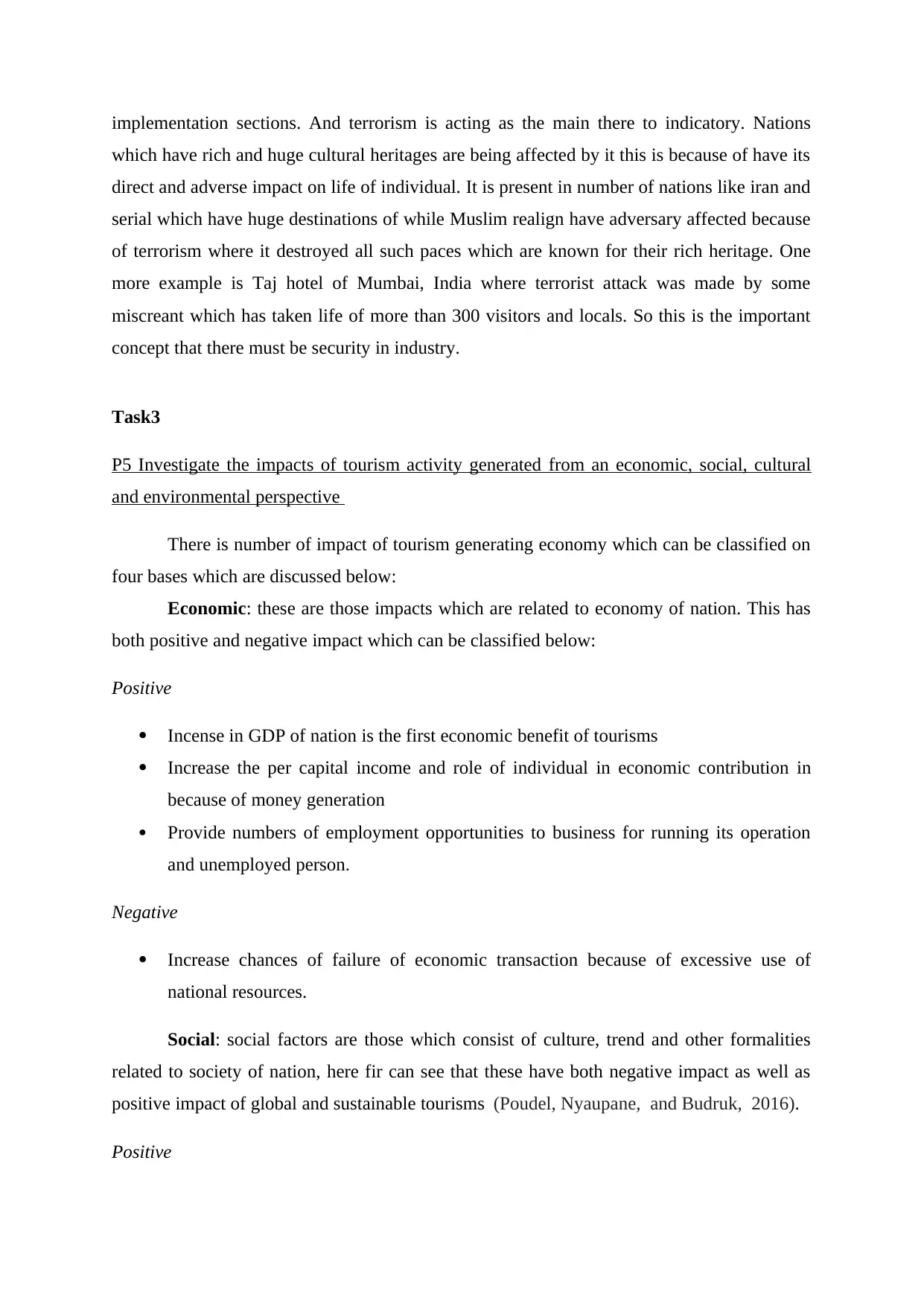
implementation sections. And terrorism is acting as the main there to indicatory. Nations
which have rich and huge cultural heritages are being affected by it this is because of have its
direct and adverse impact on life of individual. It is present in number of nations like iran and
serial which have huge destinations of while Muslim realign have adversary affected because
of terrorism where it destroyed all such paces which are known for their rich heritage. One
more example is Taj hotel of Mumbai, India where terrorist attack was made by some
miscreant which has taken life of more than 300 visitors and locals. So this is the important
concept that there must be security in industry.
Task3
P5 Investigate the impacts of tourism activity generated from an economic, social, cultural
and environmental perspective
There is number of impact of tourism generating economy which can be classified on
four bases which are discussed below:
Economic: these are those impacts which are related to economy of nation. This has
both positive and negative impact which can be classified below:
Positive
Incense in GDP of nation is the first economic benefit of tourisms
Increase the per capital income and role of individual in economic contribution in
because of money generation
Provide numbers of employment opportunities to business for running its operation
and unemployed person.
Negative
Increase chances of failure of economic transaction because of excessive use of
national resources.
Social: social factors are those which consist of culture, trend and other formalities
related to society of nation, here fir can see that these have both negative impact as well as
positive impact of global and sustainable tourisms (Poudel, Nyaupane, and Budruk, 2016).
Positive
which have rich and huge cultural heritages are being affected by it this is because of have its
direct and adverse impact on life of individual. It is present in number of nations like iran and
serial which have huge destinations of while Muslim realign have adversary affected because
of terrorism where it destroyed all such paces which are known for their rich heritage. One
more example is Taj hotel of Mumbai, India where terrorist attack was made by some
miscreant which has taken life of more than 300 visitors and locals. So this is the important
concept that there must be security in industry.
Task3
P5 Investigate the impacts of tourism activity generated from an economic, social, cultural
and environmental perspective
There is number of impact of tourism generating economy which can be classified on
four bases which are discussed below:
Economic: these are those impacts which are related to economy of nation. This has
both positive and negative impact which can be classified below:
Positive
Incense in GDP of nation is the first economic benefit of tourisms
Increase the per capital income and role of individual in economic contribution in
because of money generation
Provide numbers of employment opportunities to business for running its operation
and unemployed person.
Negative
Increase chances of failure of economic transaction because of excessive use of
national resources.
Social: social factors are those which consist of culture, trend and other formalities
related to society of nation, here fir can see that these have both negative impact as well as
positive impact of global and sustainable tourisms (Poudel, Nyaupane, and Budruk, 2016).
Positive
⊘ This is a preview!⊘
Do you want full access?
Subscribe today to unlock all pages.

Trusted by 1+ million students worldwide
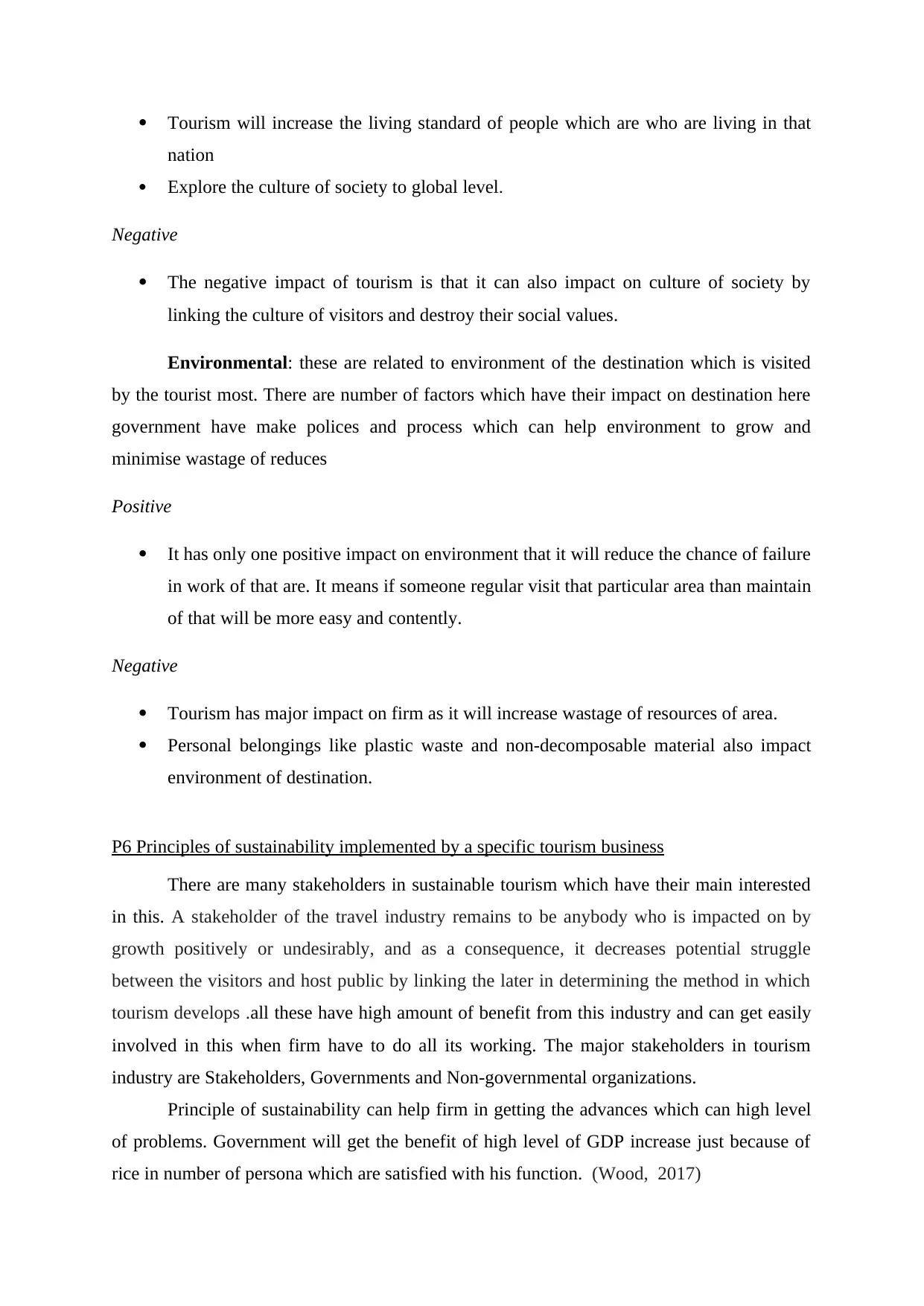
Tourism will increase the living standard of people which are who are living in that
nation
Explore the culture of society to global level.
Negative
The negative impact of tourism is that it can also impact on culture of society by
linking the culture of visitors and destroy their social values.
Environmental: these are related to environment of the destination which is visited
by the tourist most. There are number of factors which have their impact on destination here
government have make polices and process which can help environment to grow and
minimise wastage of reduces
Positive
It has only one positive impact on environment that it will reduce the chance of failure
in work of that are. It means if someone regular visit that particular area than maintain
of that will be more easy and contently.
Negative
Tourism has major impact on firm as it will increase wastage of resources of area.
Personal belongings like plastic waste and non-decomposable material also impact
environment of destination.
P6 Principles of sustainability implemented by a specific tourism business
There are many stakeholders in sustainable tourism which have their main interested
in this. A stakeholder of the travel industry remains to be anybody who is impacted on by
growth positively or undesirably, and as a consequence, it decreases potential struggle
between the visitors and host public by linking the later in determining the method in which
tourism develops .all these have high amount of benefit from this industry and can get easily
involved in this when firm have to do all its working. The major stakeholders in tourism
industry are Stakeholders, Governments and Non-governmental organizations.
Principle of sustainability can help firm in getting the advances which can high level
of problems. Government will get the benefit of high level of GDP increase just because of
rice in number of persona which are satisfied with his function. (Wood, 2017)
nation
Explore the culture of society to global level.
Negative
The negative impact of tourism is that it can also impact on culture of society by
linking the culture of visitors and destroy their social values.
Environmental: these are related to environment of the destination which is visited
by the tourist most. There are number of factors which have their impact on destination here
government have make polices and process which can help environment to grow and
minimise wastage of reduces
Positive
It has only one positive impact on environment that it will reduce the chance of failure
in work of that are. It means if someone regular visit that particular area than maintain
of that will be more easy and contently.
Negative
Tourism has major impact on firm as it will increase wastage of resources of area.
Personal belongings like plastic waste and non-decomposable material also impact
environment of destination.
P6 Principles of sustainability implemented by a specific tourism business
There are many stakeholders in sustainable tourism which have their main interested
in this. A stakeholder of the travel industry remains to be anybody who is impacted on by
growth positively or undesirably, and as a consequence, it decreases potential struggle
between the visitors and host public by linking the later in determining the method in which
tourism develops .all these have high amount of benefit from this industry and can get easily
involved in this when firm have to do all its working. The major stakeholders in tourism
industry are Stakeholders, Governments and Non-governmental organizations.
Principle of sustainability can help firm in getting the advances which can high level
of problems. Government will get the benefit of high level of GDP increase just because of
rice in number of persona which are satisfied with his function. (Wood, 2017)
Paraphrase This Document
Need a fresh take? Get an instant paraphrase of this document with our AI Paraphraser
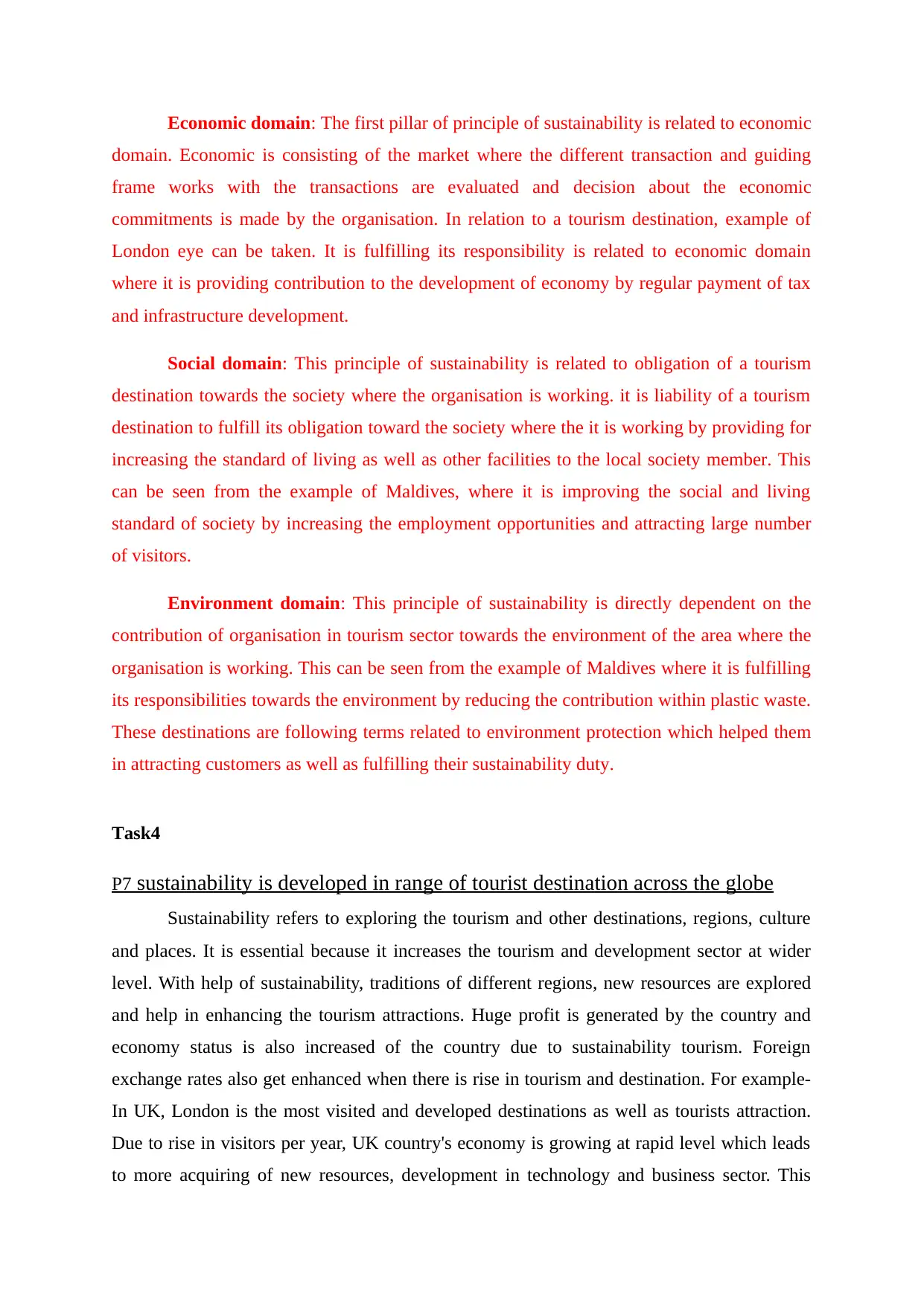
Economic domain: The first pillar of principle of sustainability is related to economic
domain. Economic is consisting of the market where the different transaction and guiding
frame works with the transactions are evaluated and decision about the economic
commitments is made by the organisation. In relation to a tourism destination, example of
London eye can be taken. It is fulfilling its responsibility is related to economic domain
where it is providing contribution to the development of economy by regular payment of tax
and infrastructure development.
Social domain: This principle of sustainability is related to obligation of a tourism
destination towards the society where the organisation is working. it is liability of a tourism
destination to fulfill its obligation toward the society where the it is working by providing for
increasing the standard of living as well as other facilities to the local society member. This
can be seen from the example of Maldives, where it is improving the social and living
standard of society by increasing the employment opportunities and attracting large number
of visitors.
Environment domain: This principle of sustainability is directly dependent on the
contribution of organisation in tourism sector towards the environment of the area where the
organisation is working. This can be seen from the example of Maldives where it is fulfilling
its responsibilities towards the environment by reducing the contribution within plastic waste.
These destinations are following terms related to environment protection which helped them
in attracting customers as well as fulfilling their sustainability duty.
Task4
P7 sustainability is developed in range of tourist destination across the globe
Sustainability refers to exploring the tourism and other destinations, regions, culture
and places. It is essential because it increases the tourism and development sector at wider
level. With help of sustainability, traditions of different regions, new resources are explored
and help in enhancing the tourism attractions. Huge profit is generated by the country and
economy status is also increased of the country due to sustainability tourism. Foreign
exchange rates also get enhanced when there is rise in tourism and destination. For example-
In UK, London is the most visited and developed destinations as well as tourists attraction.
Due to rise in visitors per year, UK country's economy is growing at rapid level which leads
to more acquiring of new resources, development in technology and business sector. This
domain. Economic is consisting of the market where the different transaction and guiding
frame works with the transactions are evaluated and decision about the economic
commitments is made by the organisation. In relation to a tourism destination, example of
London eye can be taken. It is fulfilling its responsibility is related to economic domain
where it is providing contribution to the development of economy by regular payment of tax
and infrastructure development.
Social domain: This principle of sustainability is related to obligation of a tourism
destination towards the society where the organisation is working. it is liability of a tourism
destination to fulfill its obligation toward the society where the it is working by providing for
increasing the standard of living as well as other facilities to the local society member. This
can be seen from the example of Maldives, where it is improving the social and living
standard of society by increasing the employment opportunities and attracting large number
of visitors.
Environment domain: This principle of sustainability is directly dependent on the
contribution of organisation in tourism sector towards the environment of the area where the
organisation is working. This can be seen from the example of Maldives where it is fulfilling
its responsibilities towards the environment by reducing the contribution within plastic waste.
These destinations are following terms related to environment protection which helped them
in attracting customers as well as fulfilling their sustainability duty.
Task4
P7 sustainability is developed in range of tourist destination across the globe
Sustainability refers to exploring the tourism and other destinations, regions, culture
and places. It is essential because it increases the tourism and development sector at wider
level. With help of sustainability, traditions of different regions, new resources are explored
and help in enhancing the tourism attractions. Huge profit is generated by the country and
economy status is also increased of the country due to sustainability tourism. Foreign
exchange rates also get enhanced when there is rise in tourism and destination. For example-
In UK, London is the most visited and developed destinations as well as tourists attraction.
Due to rise in visitors per year, UK country's economy is growing at rapid level which leads
to more acquiring of new resources, development in technology and business sector. This
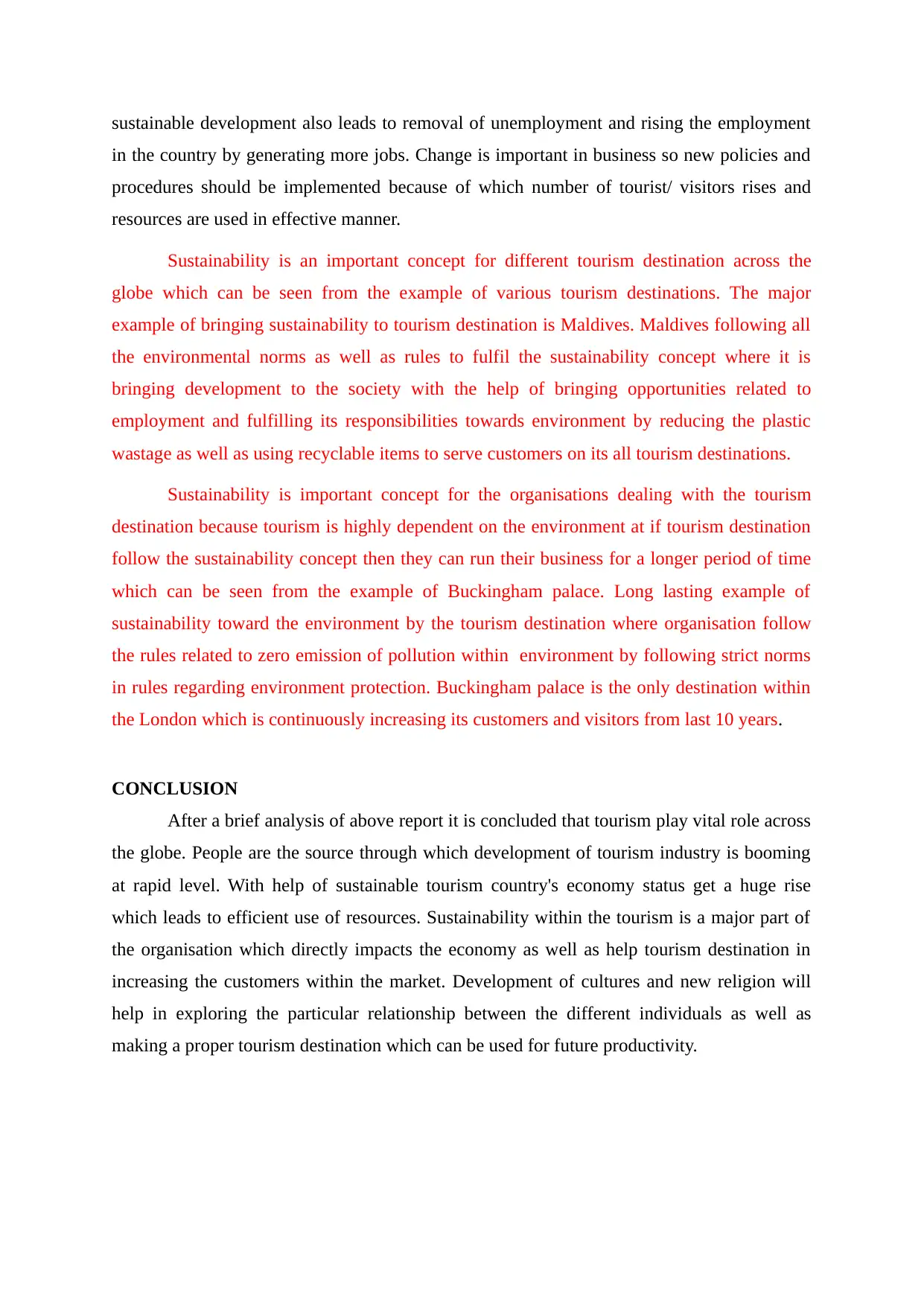
sustainable development also leads to removal of unemployment and rising the employment
in the country by generating more jobs. Change is important in business so new policies and
procedures should be implemented because of which number of tourist/ visitors rises and
resources are used in effective manner.
Sustainability is an important concept for different tourism destination across the
globe which can be seen from the example of various tourism destinations. The major
example of bringing sustainability to tourism destination is Maldives. Maldives following all
the environmental norms as well as rules to fulfil the sustainability concept where it is
bringing development to the society with the help of bringing opportunities related to
employment and fulfilling its responsibilities towards environment by reducing the plastic
wastage as well as using recyclable items to serve customers on its all tourism destinations.
Sustainability is important concept for the organisations dealing with the tourism
destination because tourism is highly dependent on the environment at if tourism destination
follow the sustainability concept then they can run their business for a longer period of time
which can be seen from the example of Buckingham palace. Long lasting example of
sustainability toward the environment by the tourism destination where organisation follow
the rules related to zero emission of pollution within environment by following strict norms
in rules regarding environment protection. Buckingham palace is the only destination within
the London which is continuously increasing its customers and visitors from last 10 years.
CONCLUSION
After a brief analysis of above report it is concluded that tourism play vital role across
the globe. People are the source through which development of tourism industry is booming
at rapid level. With help of sustainable tourism country's economy status get a huge rise
which leads to efficient use of resources. Sustainability within the tourism is a major part of
the organisation which directly impacts the economy as well as help tourism destination in
increasing the customers within the market. Development of cultures and new religion will
help in exploring the particular relationship between the different individuals as well as
making a proper tourism destination which can be used for future productivity.
in the country by generating more jobs. Change is important in business so new policies and
procedures should be implemented because of which number of tourist/ visitors rises and
resources are used in effective manner.
Sustainability is an important concept for different tourism destination across the
globe which can be seen from the example of various tourism destinations. The major
example of bringing sustainability to tourism destination is Maldives. Maldives following all
the environmental norms as well as rules to fulfil the sustainability concept where it is
bringing development to the society with the help of bringing opportunities related to
employment and fulfilling its responsibilities towards environment by reducing the plastic
wastage as well as using recyclable items to serve customers on its all tourism destinations.
Sustainability is important concept for the organisations dealing with the tourism
destination because tourism is highly dependent on the environment at if tourism destination
follow the sustainability concept then they can run their business for a longer period of time
which can be seen from the example of Buckingham palace. Long lasting example of
sustainability toward the environment by the tourism destination where organisation follow
the rules related to zero emission of pollution within environment by following strict norms
in rules regarding environment protection. Buckingham palace is the only destination within
the London which is continuously increasing its customers and visitors from last 10 years.
CONCLUSION
After a brief analysis of above report it is concluded that tourism play vital role across
the globe. People are the source through which development of tourism industry is booming
at rapid level. With help of sustainable tourism country's economy status get a huge rise
which leads to efficient use of resources. Sustainability within the tourism is a major part of
the organisation which directly impacts the economy as well as help tourism destination in
increasing the customers within the market. Development of cultures and new religion will
help in exploring the particular relationship between the different individuals as well as
making a proper tourism destination which can be used for future productivity.
⊘ This is a preview!⊘
Do you want full access?
Subscribe today to unlock all pages.

Trusted by 1+ million students worldwide
1 out of 15
Related Documents
Your All-in-One AI-Powered Toolkit for Academic Success.
+13062052269
info@desklib.com
Available 24*7 on WhatsApp / Email
![[object Object]](/_next/static/media/star-bottom.7253800d.svg)
Unlock your academic potential
Copyright © 2020–2026 A2Z Services. All Rights Reserved. Developed and managed by ZUCOL.





